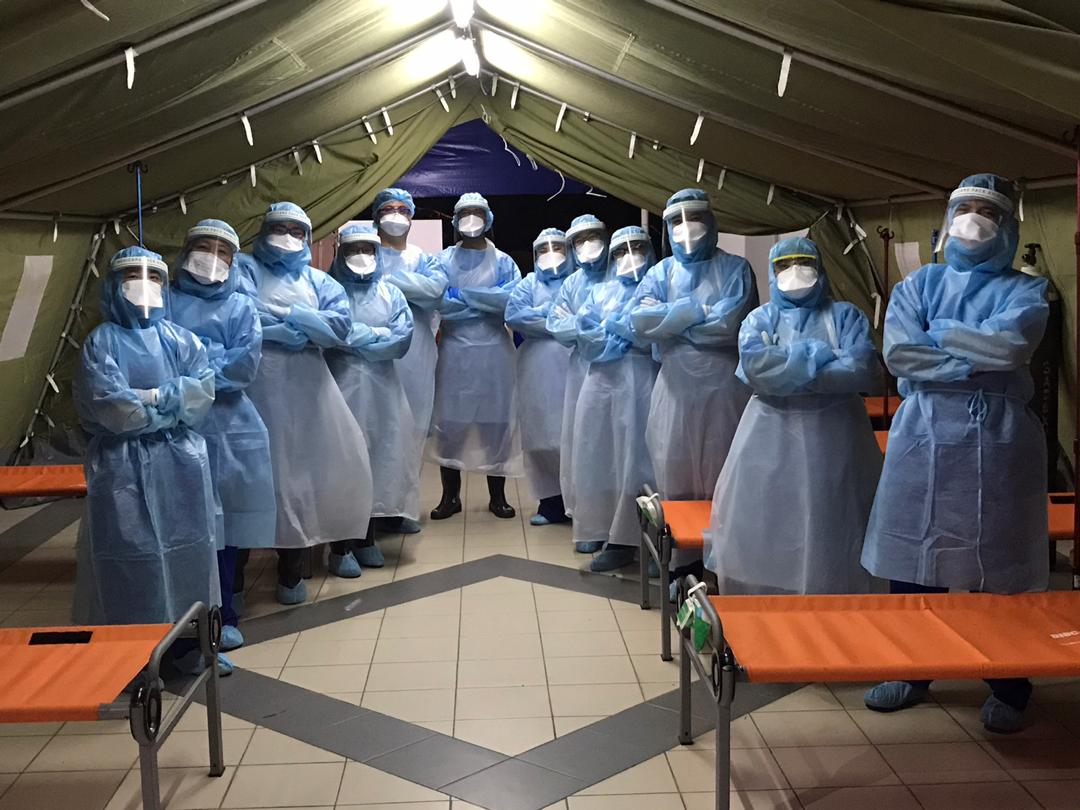KUALA LUMPUR, Oct 23 — Sabah’s coronavirus crisis is worsening, as critical Covid-19 patients wait a few days to get into intensive care, hospital beds reach full capacity, and seasoned doctors near burnout.
Despite the federal Ministry of Health (MOH) mobilising nearly 800 medical and public officers to Sabah (majority from within the state) and non-governmental organisations (NGOs) sending assistance to the beleaguered state, government doctors in two public hospitals said manpower was still short.
Sabah has even broken away from federal MOH protocol on admitting confirmed coronavirus cases into a hospital, or quarantine and treatment centres for low-risk patients, as the state began allowing early-stage Covid-19 patients to be treated at home. Sabah Local Government and Housing Minister Masidi Manjun, who did not elaborate on guidelines for home treatment, said yesterday that Sabah hospitals have already reached full bed capacity for Covid-19 patients.
Yesterday, Sabah reported 578 new Covid-19 cases, the fifth consecutive day of daily infections above 500, as Malaysia’s poorest state battles 5,624 active cases.
On October 12, CodeBlue published a story of frontliners working on the ground in Sabah, who shared their life experience in handling the Covid-19 pandemic. They shared their concerns on personal protective equipment (PPE) that was running out, the overwhelming number of patients, and their exhaustion working long hours due to lack in manpower.
After the federal government and NGOs rallied up additional support for Sabah, CodeBlue reached out again to medical frontliners on the ground from Queen Elizabeth Hospital, Semporna Hospital, Tawau Hospital, and Sandakan Hospital, including three doctors and one pharmacist, to find out if the situation is improving.
Observations were also made through social media posts. The identity of these officers are kept anonymous as government officers are not allowed to speak to the media without permission from their higher-ups.
Critical Covid-19 Patients Overwhelm Queen Elizabeth Hospital ICU
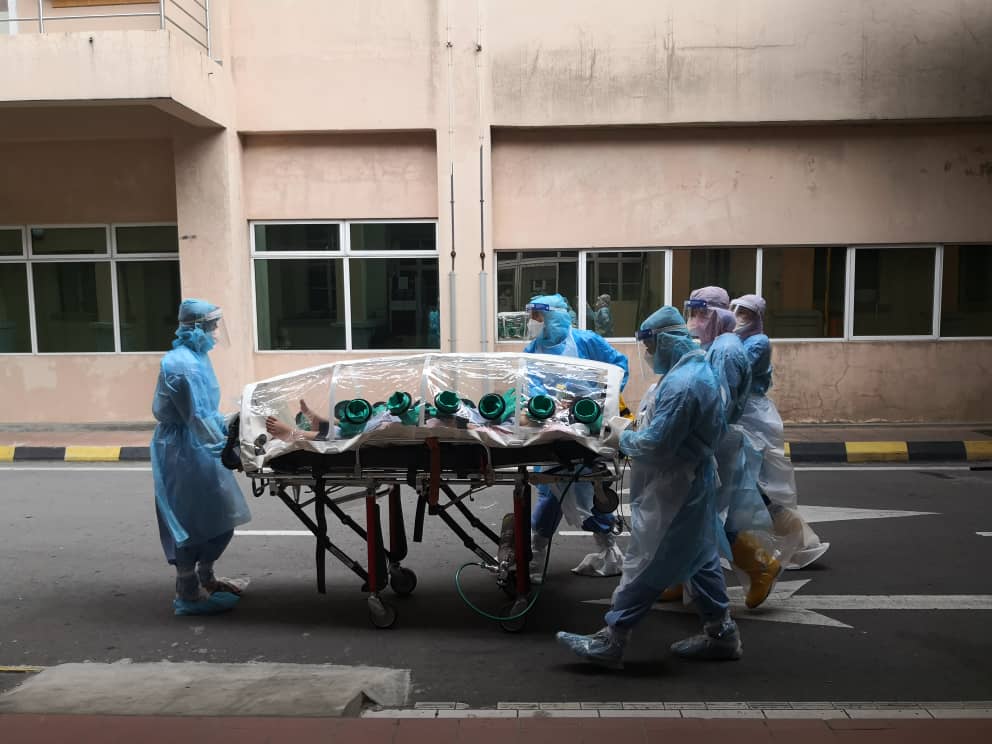
A physician from Queen Elizabeth Hospital in Kota Kinabalu told CodeBlue that the hospital’s ICU is unable to accommodate so many severely ill Covid-19 patients. The state capital of Sabah has reported 1,582 local Covid-19 cases within the past 14 days as of October 22, including 233 new infections yesterday.
“The main problem with providing critical care now is the number of beds for these groups of patients,” said the physician from Sabah’s tertiary referral hospital.
“Our ICU cannot accommodate so many ill patients and the wards are not equipped to handle these ill patients.”
Anonymous Queen Elizabeth Hospital doctor
Due to the lack of ICU beds to accommodate severely sick patients, these patients are stabilised and have to wait for a maximum of up to two days in the emergency department.
“We don’t reject patients. At least so far, we don’t have too. This morning (October 22), I think we’ve managed to clear out the ill one,” the doctor said.
A fully equipped ICU includes trained ICU nurses and doctors to effectively treat patients. ICU beds have additional equipment like ventilators or feeding tubes. Covid-19 patients in ICU are under constant monitoring, as they may suddenly die when their condition deteriorates rapidly.
The doctor said that even the normal Covid-19 wards in Queen Elizabeth Hospital, which initially started with three wards, have now been increased to 15 wards.
“New wards are being opened and there are plans to further increase beds for critically ill patients,” the physician highlighted.
However, the doctor said that even if they increase the number of beds for critically ill coronavirus patients, there is a shortage of nurses to provide care for these patients who require continuous monitoring as they are unstable.
“Doctors are enough. We are mobilising various departments and bringing doctors from elsewhere, (but) nurses are really not enough,” the doctor stressed.
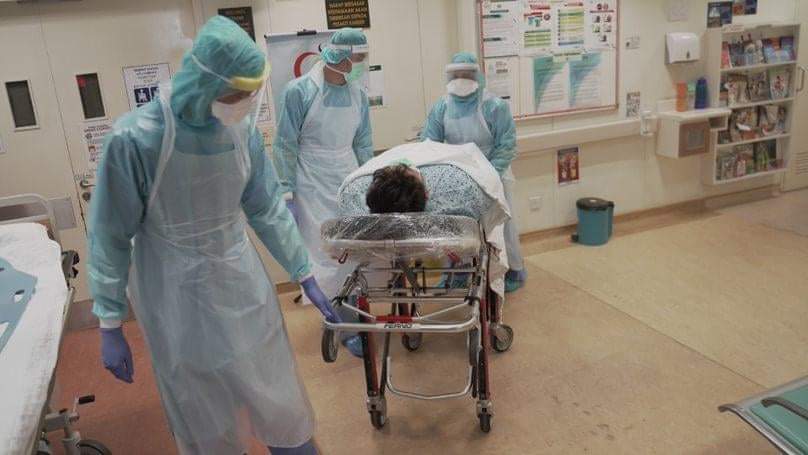
MOH tweeted yesterday that 668 nurses have been mobilised from within and outside Sabah to help with the state’s Covid-19 outbreak, besides hiring 3,307 contract nurses.
Critically ill patients are those in stage four and five of the Covid-19 disease. Stage four patients are Covid-19 patients who suffer from pneumonia and require supplemental oxygen, while stage five patients are on ventilators. The doctor said relatively stable stage four patients are allowed to stay in the normal ward.
Less than two weeks ago, the doctor told CodeBlue that Queen Elizabeth Hospital was opening two new Covid-19 wards each week after initially starting with three wards. Now, they have 15 wards in total for Covid-19 patients.
“I think ventilators are so far sufficient, because I can see them waiting to be used,” said the physician.
Unfortunately, the doctor said the Covid-19 cases in Sabah were all in the community and sporadic everywhere, with unknown sources of transmission, unlike the previous wave in the country that started from a single religious mass gathering in Kuala Lumpur.
“In the beginning (of the pandemic), those infected were mainly from the Tabligh cluster, or with clear epidemiological links. Now, Sabah is like Ground Zero. It’s everywhere.”
Anonymous Queen Elizabeth Hospital doctor
In a data study done by CodeBlue, it was found that 94.4 per cent of the nation’s sporadic cases from September 11 until October 14 were from Sabah. The data also showed that nine out of 10 reported cases in Sabah were sporadic for four days from October 7 to 8 and October 11 to 12.
Sabah has been continuously reporting three-digit Covid-19 cases this month, with the highest number of cases reported on October 18, a total of 702 cases. Yesterday, Sabah reported 578 coronavirus infections. Since October 8, Sabah has been continuously reporting Covid-19 fatalities every day, with the highest number recorded on October 9 and October 18, with six death cases each.
Moreover, the Queen Elizabeth Hospital doctor shared that with more ill patients, the hospital is short of safer PPE to be used for severely sick patients, like powered air purifying respirator, that was not really needed last time. The hospital has also stocked up on PPE since the last Covid-19 wave, but the doctor said it might run out soon.
On October 18, Malaysiakini reported that patients had to wait for a long time before being taken to the hospital. A patient took to social media and commented on Health director- general Dr Noor Hisham Abdullah’s Facebook page that he had been waiting for almost five days at home since he tested positive for Covid-19, and even started experiencing shortness of breath, but was not brought to a hospital by MOH officers.
The doctor from Queen Elizabeth Hospital said that it is true that some Covid-19 patients have to wait for so long, one of the reasons being limitations in transportation. A coordinated arrangement is needed for MOH officers to transport the patients from their home to the hospital and then to the ward. Some of the patients’ houses in rural Sabah are inaccessible by road.
“Depends on the rate of discharge, and rate of admissions. In more than out, then longer waiting time. I think it’s true some people wait long. I don’t have the figures,” the doctor said.
Tawau Needs More Manpower If Cases Continue To Spike
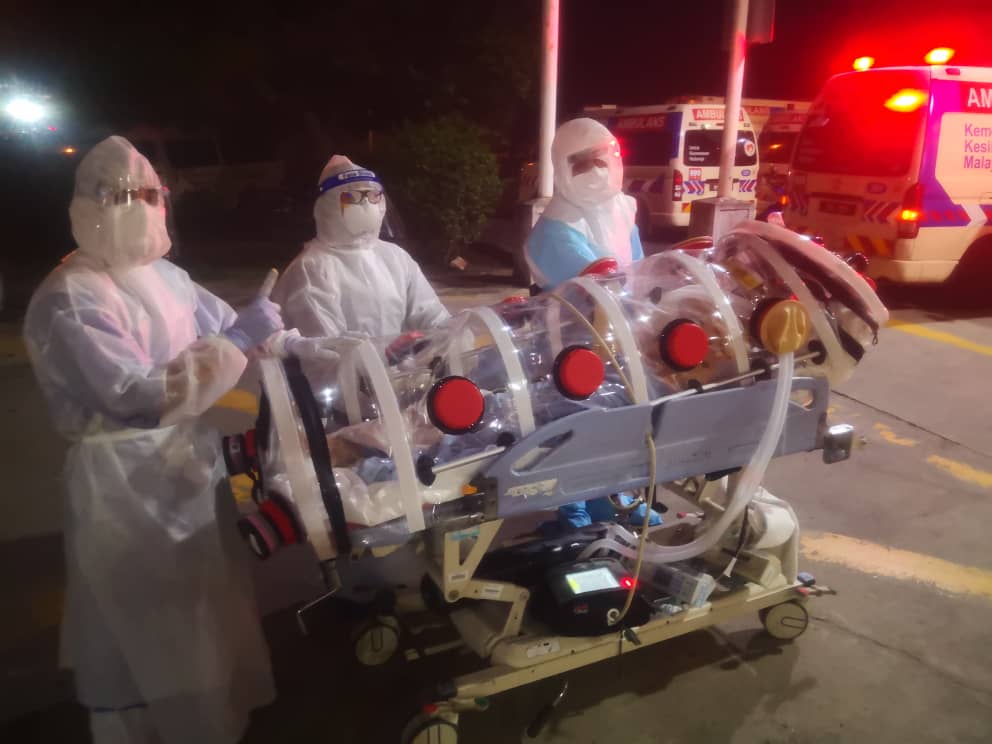
A specialist from Tawau Hospital told CodeBlue that the hospital heavily depends on the manpower from peninsular Malaysia. The doctor said that the hospital is coping with the current available manpower, but will not be able to do so if Covid-19 cases continue to increase. As of October 21, Tawau had 1,005 active Covid-19 cases.
“If the current trend continues, then will need even more manpower reinforcement from Peninsular,” the specialist said.
The specialist said that some of the contract medical officers from Tawau Hospital will be sent out to other parts of Sabah in the coming weeks, so things might change in terms of manpower then.
“(We have) adequate specialists for now, but it will be better to have more medical officers.”
The Malaysian Armed Forces’ field hospital in Tawau is equipped with 100 beds, ICU, and operation theatres to treat non-Covid-19 patients.
“General medical patients (non-Covid) are being shifted to the field hospital; only stable patients can be sent over,” the doctor said.
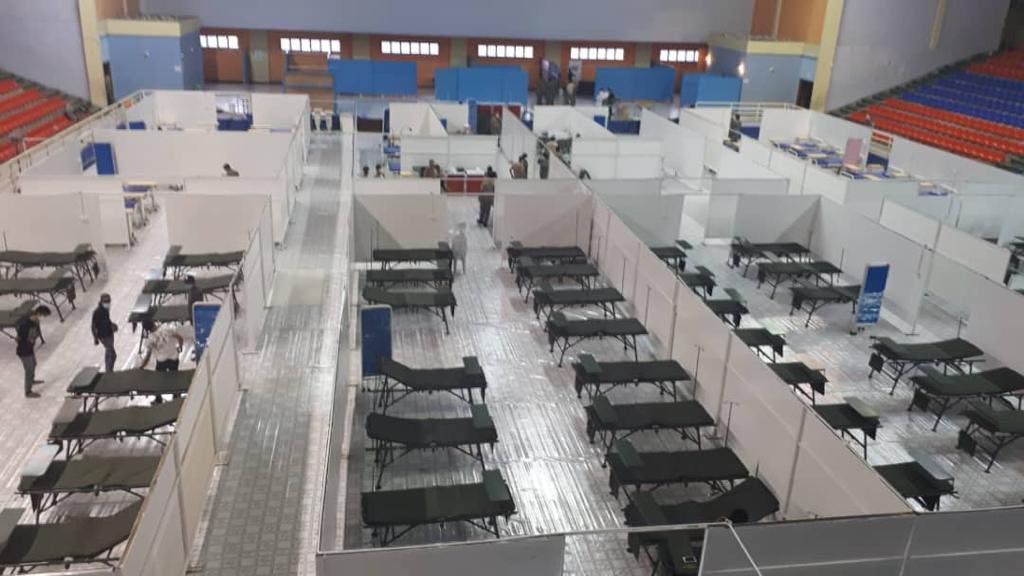
The Tawau doctor also suggested for more microbiologists to be sent over to Sabah so that Covid-19 testing services can be extended to even 24/7.
In terms of PPE and ventilators, the doctor said that Tawau Hospital has enough for now, but health care workers will require a continuous supply of PPE because of heavy use.
“PPE is adequate for now, but it has a high usage (can be up to over 400 sets per day in Tawau), will need continuous supplies to maintain it.”
It was previously highlighted by a medical officer in Tawau that Covid-19 patients requiring supplemental oxygen admitted to Tawau Hospital are increasing. The Tawau specialist also agreed that stage four and five Covid-19 patients in Sabah are higher than the national average.
Patients who get tested positive for Covid-19 are categorised into five stages. Those who are in stage three to five are admitted to hospitals. Fortunately, the doctor said that so far, there have not been any cases whereby Covid-19 patients die at home because of delay in seeking treatment.
Semporna Hospital Severely Lacks Manpower
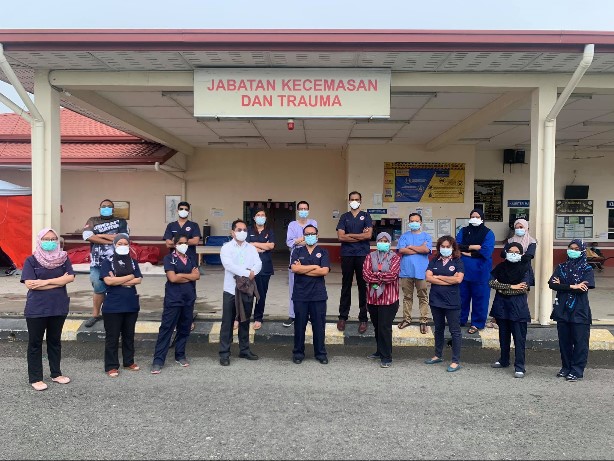
A doctor, who is part of the Covid-19 team in Semporna Hospital, said that the hospital severely lacks manpower.
“Medical officers work six days a week with long hours. Their schedule is from 8am till 5pm, yet sometimes they go home at 10pm or 11pm,” the doctor said.
“Many of them, even the toughest medical officers are on the verge of breaking down or burnt out.”
Anonymous Semporna Hospital doctor
As for the long waiting time for Covid-19 patients to be admitted or to be brought to the hospital, the doctor said that it is because there is a lack of manpower to screen these patients and to stratify them based on their risk .
“As far as in Semporna, low risk centres, patients are quarantined at the Bubul Ria people’s housing project (PPR).”
On October 21, Masidi acknowledged that medical frontliners in Sabah are stretched out, but said they are still coping with the work.
The doctor from Semporna also highlighted that Semporna Hospital does not have ICU beds, so patients that are required to be managed in an ICU setting will be transferred to Tawau Hospital.
“Last week, Semporna had opened a Covid ward. So, that is why less patients are needed to be transferred to Tawau. That relieves Tawau quite a bit. Sicker patients will be transferred to Tawau,” the doctor told CodeBlue.
The doctor pointed out that Covid-19 patients who come into Semporna Hospital are from all age groups, while patients who are above 50 years of age with co-morbidities are at a higher risk of deteriorating.
The patients seen in Semporna Hospital are more ill, according to the doctor. A medical officer from Tawau Hospital who previously spoke to CodeBlue also said that most patients that are referred from Semporna Hospital are intubated and if their condition gets worse despite the intubation, they succumb to death.
Health experts have said that patients are more ill in Sabah, meaning those who suffer from pneumonia with or without supplemental oxygen, or on ventilators, are because many seek late treatment. This is either due to poor transportation or because most of them are undocumented migrants who are unable to pay hospital bills.
Fortunately, the doctor in Semporna Hospital said that PPE is adequate so far on the ground.
Beluran Hospital Tent For Covid-19 Swabs Breaks Very Often
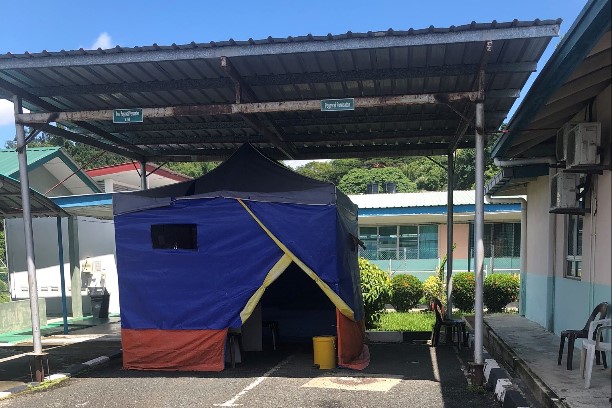
A volunteer from Beluran Hospital posted on Twitter that the tent that is being used to take Covid-19 swabs is small and often breaks, and the hospital staff themselves have to fix it.
The volunteer said that they have put the tent under a parking spot with a roof so that the frontliners carrying out the swab test are not left in the heat, which is worsened with their PPE suit.
They will be building a wall, with proper ventilation and fan at the parking spot, so that frontliners are able to swab people comfortably.
Sandakan Hospital Has Adequate PPE
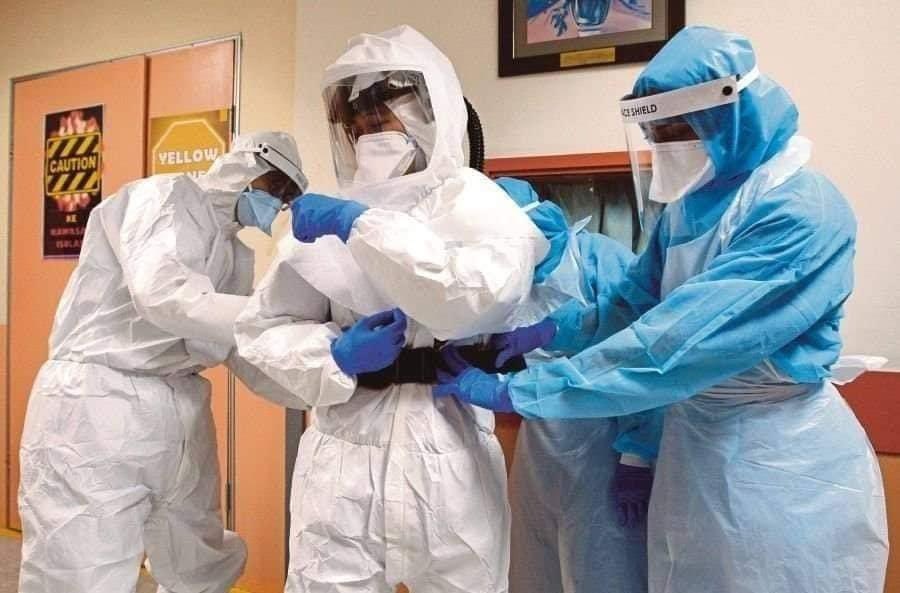
A pharmacist from Sandakan Hospital told CodeBlue that the hospital has adequate PPE for now.
“So far, no wards or clinics complained not enough (of PPE),” the pharmacist said.
However, the pharmacist was unable to disclose the number of weeks their PPE stock would last as according to the pharmacist, the usage and stock of PPE is confidential.
MOH has increased Sabah’s daily RT-PCR testing capacity from 1,350 tests per day in July to 2,600 tests now. A total of 100,000 RTK Ag kits have also been sent over to Sabah to be used for a month. Besides that, MOH has also increased the total number of ventilators and intensive care unit (ICU) beds in Sabah to 180 and 122 respectively.


